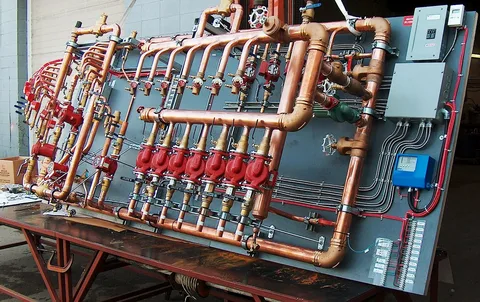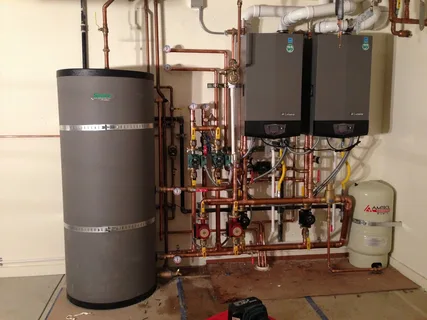Are you tired of dealing with cold drafts and uneven heating in your home? Look no further than hydronic heating panels! In this complete guide, we’ll explore the numerous benefits of these innovative heating systems, from increased energy efficiency to improved comfort levels. Say goodbye to chilly winters and hello to cozy warmth with hydronic heat panels – your ticket to a more comfortable and cost-effective home environment. Are you tired of cold floors and uneven heating in your home during the winter months? Look no further than hydronic heat panels! These innovative heating systems offer a comfortable solution to keep your space warm and cozy.
How Do Hydronic Heat Panels Work?
Hydronic heat panels operate by circulating hot water through a system of pipes installed behind the panels. These panels are typically mounted on walls or ceilings, allowing for efficient and even distribution of heat throughout a space. The heated water warms up the panels, which in turn radiate heat into the room.
As the water flows through the piping network, it absorbs warmth from a boiler or water heater. This heated water then returns to the system to be reheated and circulated again, creating a continuous cycle that keeps your space comfortably warm. By utilizing radiant heat transfer, hydronic systems efficiently distribute warmth without relying on forced air.
Unlike traditional heating systems that can lead to uneven temperatures and drafts, hydronic heat panels provide consistent and silent heating. Additionally, these systems can be customized to suit different temperature preferences in various rooms of your home or building.
 The Advantages of Using Hydronic Radiant Floor Heating Panels
The Advantages of Using Hydronic Radiant Floor Heating Panels
Hydronic radiant floor heating panels offer numerous advantages that make them a popular choice for heating residential and commercial spaces. One of the main benefits is their energy efficiency, as they operate by circulating hot water through pipes to radiate heat evenly throughout a room. This method of heating helps reduce energy consumption and lower utility bills.
Another advantage of hydronic heat panels is their ability to provide consistent warmth without creating drafts or uneven temperature distribution. Unlike traditional forced-air systems, which can sometimes lead to hot spots or cold areas in a room, hydronic panels ensure an even and comfortable temperature throughout the space.
Additionally, these panels are known for their quiet operation, making them ideal for bedrooms or offices where noise levels need to be kept at a minimum. The radiant heat produced by hydronic panels also promotes better air quality by reducing dust circulation and allergens in the air.
Types of Hydronic Heat Panels
When it comes to types of hydronic heat panels, there are a few options to choose from based on your heating needs. One common type is the wall-mounted hydronic panel, which can blend seamlessly into any room while providing efficient heating. These panels come in various sizes and designs to suit different aesthetics.
Another option is the floor-mounted hydronic panel, which can be installed beneath flooring materials like tile or wood for even heat distribution throughout the space. This type of panel is ideal for rooms where wall space is limited.
Ceiling-mounted hydronic panels are also available for those looking to maximize their floor and wall space. These panels provide overhead heating that radiates warmth downwards, creating a comfortable environment in larger areas. Overall, choosing the right type of hydronic heat panel will depend on factors such as room size, layout, and personal preferences.
Installation Process and Hydronic Heating Panels Price
When it comes to installing hydronic heat panels, the process is relatively straightforward. First, a professional will assess your space to determine the best placement for the panels. Then, they will install the panels either on the walls or ceilings, depending on your preference and heating needs. The installation hydronic heating panels price can vary depending on factors such as the size of your space, the number of panels needed, and any additional features you choose.
On average, however, installation costs are typically competitive with other heating systems.
Since hydronic heat panels require professional installation to ensure optimal performance and efficiency, it’s recommended to budget for this expense when considering this heating option.
Keep in mind that while there may be upfront costs associated with installation, many homeowners find that the long-term benefits outweigh these expenses in terms of comfort and energy savings.
Maintenance and Lifespan of Hydronic Heating Panels for Sale
Regular Cleaning:
The first and most important step in maintaining hydronic heating panels for sale is to regularly clean them. This involves wiping down the panels with a damp cloth to remove any dust or debris that may have accumulated on the surface. It is recommended to do this at least once a month to prevent buildup and maintain the efficiency of the panels.
Check for Leaks
Another important aspect of maintenance is checking for any leaks in the system. This can be done by inspecting all connections, valves, and pipes for any signs of water leakage. If you notice any leaks, it is important to address them immediately to prevent further damage to the system.
Flushing the System
Over time, sediment and mineral deposits can build up within the hydronic heating system, which can affect its performance and lifespan. To avoid this issue, it is recommended to flush out the system every few years. This involves draining all the water from the system and then refilling it with fresh water.
Climate Conditions
The climate conditions in which the system operates can also have an impact on its lifespan. Extreme temperatures or harsh weather conditions can put additional strain on the system and decrease its lifespan.
Upkeep of Other System Components
It’s not just the panels themselves that affect their lifespan; other components such as pumps, valves, and pipes also play a role. Regular maintenance and replacement of any worn-out parts can help extend the overall lifetime of your hydronic heating system.
Comparing Hydronic Heat Panels to Other Heating Systems
When it comes to heating systems, hydronic heat panels stand out for their efficiency and comfort. Compared to traditional forced-air systems, hydronic panels provide even warmth throughout the space without the noise or drafts commonly associated with vents. Unlike electric baseboard heaters that can be costly to operate, hydronic panels use water as a heat transfer medium, resulting in lower energy bills over time. Additionally, radiant floor heating can be more effective than air-based systems since heat rises from the ground up.
Compared to wood stoves or fireplaces that require constant refueling and cleaning, hydronic heat panels are low maintenance and offer consistent heating without the hassle of tending to a fire. In terms of installation costs, while initial investment may be higher than some systems, the long-term savings on energy make them a cost-effective choice in the long run. Overall, when considering different heating options for your home or business, hydronic heat panels offer numerous advantages that set them apart from other traditional heating methods.
Environmental Benefits of Hydronic Radiant Heat System
Energy Efficiency
One of the main environmental benefits of hydronic radiant heat is its high level of energy efficiency. Unlike traditional forced-air heating systems that rely on blowing hot air through vents, hydronic systems use water as a medium for transferring heat. This method eliminates the need for fans or blowers, resulting in less energy consumption and lower utility bills. Additionally, since hot water retains its temperature for longer periods than air does, less energy is required to maintain a consistent level of warmth in a space.
Reduced Carbon Footprint
Another significant advantage of hydronic radiant heating is its minimal impact on the environment. By reducing energy consumption and promoting more efficient use of resources, these systems can help reduce carbon emissions and combat climate change. Furthermore, because they do not require ductwork like traditional HVAC systems do, there is no risk of indoor air pollution caused by dust accumulation or mold growth in ducts.
Air Quality Improvement
The third environmental benefit of hydronic radiant heating relates to indoor air quality (IAQ). Traditional forced-air heating relies on blowing heated air through ducts that can accumulate dust particles over time if not adequately maintained. This results in poorer IAQ as the dust particles recirculate into living spaces with each cycle. In contrast, hydronic radiant heating does not use ducts, eliminating the issue of dust accumulation and improving IAQ.
Renewable Energy Compatibility
Hydronic radiant heating systems are highly compatible with renewable energy sources such as solar or geothermal energy. These systems can use these alternative sources to heat the water that circulates through the pipes, reducing reliance on fossil fuels and further decreasing carbon emissions. This adaptability makes hydronic radiant heating a sustainable choice for homeowners and building owners looking to reduce their environmental impact.
Common Misconceptions About Hydronic Heat Panels
When it comes to hydronic heat panels, there are some common misconceptions that may deter people from considering this efficient heating system. One misconception is that hydronic heat panels are only suitable for new construction. In reality, they can be installed in existing homes with minimal disruption.
Another misconception is that hydronic heat panels are expensive to operate. However, these systems are actually very energy-efficient and can help reduce heating costs in the long run. There’s also a belief that hydronic heat panels take a long time to warm up a room, but they actually provide consistent and even warmth quickly.
Some may think that hydronic heat panels require a lot of maintenance, but in truth, they have low maintenance requirements compared to other heating systems. It’s important to debunk these misconceptions and consider the many benefits that hydronic heat panels offer for comfortable and cost-effective home heating.
Conclusion
Hydronic heating panels offer a range of benefits that make them an attractive option for heating homes and commercial buildings. From their energy efficiency and cost-effectiveness to their minimal maintenance requirements and environmental friendliness, hydronic heat panels provide a reliable and comfortable heating solution. When considering the installation of a new heating system or replacing an existing one, it’s worth exploring the advantages of hydronic heat panels. With proper installation and regular maintenance, these systems can provide consistent warmth while helping to reduce energy consumption and carbon footprint.
FAQs
1. What is a hydronic heat panel?
A hydronic heat panel, also known as a radiant heating panel, is a type of heating system that uses hot water or steam to evenly distribute heat throughout a space. It is typically installed on walls or ceilings and can be used for both residential and commercial buildings.
2. How do hydronic heating panels work?
Hydronic heat panels work by circulating heated water from a central boiler through a network of pipes within the panel. The pipes are usually made of copper or PEX tubing, which allows the hot water to radiate heat into the room without any noise or air movement.
3. Are there different types of hydronic heat panels?
Yes, there are two main types of hydronic heat panels – radiant floor panels and radiant ceiling/wall panels. Radiant floor panels are installed under flooring materials such as tile, concrete, or wood and provide warmth from the ground up. Radiant ceiling/wall panels, on the other hand, are installed on walls or ceilings and release heat downwards into the room.
| Other Good Articles to Read |
| Blogs Rain |
| Cme Blog Spot |
| Garcias Blogs |
| Yyc Blogs |
| Guiade Blogs |
| Blogs-Hunt |
| Impact-Blog |
| Smarty Blogs |
| Ed Blog |
| Mo Blogs |
| Blogs Em |
| Related Business Listings |
| Contact Directory |
| Local Business Profiles |



